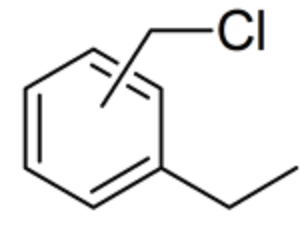HI! I’M ELEMENT AI.
Ethylbenzyl Chloride

Product Description
Ethylbenzyl chloride, also known as α-chloroethylbenzene, is utilized in various industrial applications.
Product:
Ethylbenzyl Chloride
CAS:
26968-58-1
Synonym:
α-chloroethylbenzene; 1-chloropropylbenzene; (Chloromethyl)ethylbenzene
Structure:

Typical Characteristics
Appearance
Clear colorless liquid
Boiling point
111 ºC/25mmHg
Density
1.031 g/cm3
Flash Point
82.7 ºC
Melting point
-21 ºC
Molecular Weight
154.64
Purity
99%
Refractive index
1.520
Uses, Applications & Markets
Key applications
get a quote
We Offer Ethylbenzyl Chloride
in various grades
A few of the grades available are listed below:



Ethylbenzyl Chloride used in many
industry applications
Ethylbenzyl chloride, also known as α-chloroethylbenzene, is utilized in various industrial applications. Here are some of its common uses:
- Chemical Intermediate: Ethylbenzyl chloride serves as an important intermediate in organic synthesis, particularly in the production of pharmaceuticals, agrochemicals, and specialty chemicals. It undergoes various chemical reactions to form a wide range of organic compounds used in diverse industrial applications.
- Surfactant Production: It may be used in the manufacture of surfactants, which are compounds that reduce the surface tension between two substances. Surfactants find applications in industries such as detergents, personal care products, and industrial cleaning agents.
- Corrosion Inhibitor: Ethylbenzyl chloride can be employed as a corrosion inhibitor in various industrial processes to protect metal surfaces from degradation caused by exposure to corrosive environments. It forms a protective layer on metal surfaces, preventing the onset and spread of corrosion.
- Hydrocarbon Solvent: It may be used as a solvent or diluent in certain industrial processes where hydrophobic properties are required. Ethylbenzyl chloride can dissolve a wide range of organic compounds and is employed in applications such as paint thinners, degreasers, and cleaning solvents.
- Chemical Reagent: Ethylbenzyl chloride serves as a chemical reagent in various laboratory reactions and industrial processes. It participates in substitution, addition, and elimination reactions to form new chemical compounds or modify existing molecules, contributing to the synthesis of diverse organic substances.
- Polymerization Initiator: It may be used as a polymerization initiator or catalyst in the production of certain polymers and resins. Ethylbenzyl chloride initiates polymerization reactions, leading to the formation of high molecular weight compounds with desirable properties for various industrial applications.
- Research and Development: Ethylbenzyl chloride is utilized in research laboratories and academic institutions as a chemical standard, reference material, or experimental reagent. It enables scientists and researchers to study the properties, reactions, and applications of aromatic compounds, contributing to advancements in various fields of science and technology.